Einer Rubio won Stage 3 of the UAE Tour, attacking at the foot of Jebel Jais with the help of a brief leadout from his Movistar team mate Albert Torres. He then went away solo and held on for the win. It’s a big victoryr on climb normally all about being able to sit on a wheel while team mate mates set the pace; it’s not the story of someone sneaking away for a plucky win.
Rubio will be Movistar’s leader for the Giro. We’ll see what he can do, you’d think they’d probably sign for a top-10 and a stage today? He’s got a couple of things in common with Jai Hindley, they both won the tough GP Carpdarco and they both rode for the same U23 team in Italy’s Abruzzo region, VC Aran Cucine Vejus before turning pro, an unusual route.
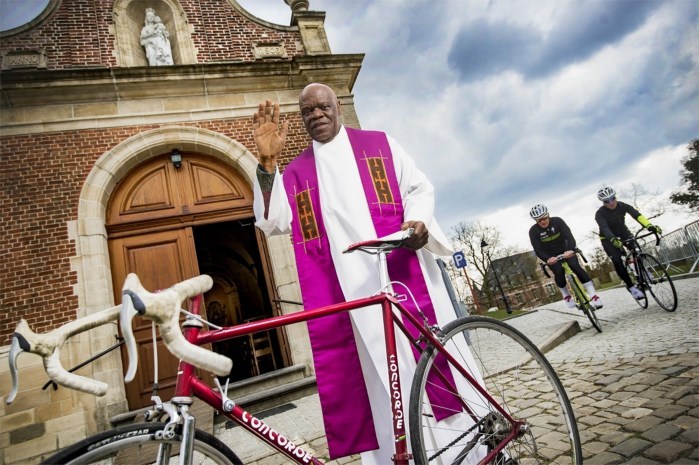
It’s openingsweekend in Belgium. There’s a jolt as the sport swaps sunny climes of the Mediterranean and Middle-East for the pale weak light of Belgium but the intensity of course goes up. One reader emailed the other day asking about things to do on a visit to the Flemish classics and one suggestion in reply was to buy a newspaper just to feel the weight of content dedicated to the classics and cycling, and all the tangential stories around it. Scan the papers and they’re packed and it’s far from Remco this, Remco that. Tom Boonen’s split up with his long term girlfriend, not normally something to cover here but it’s providing a lot of column inches in Flanders.
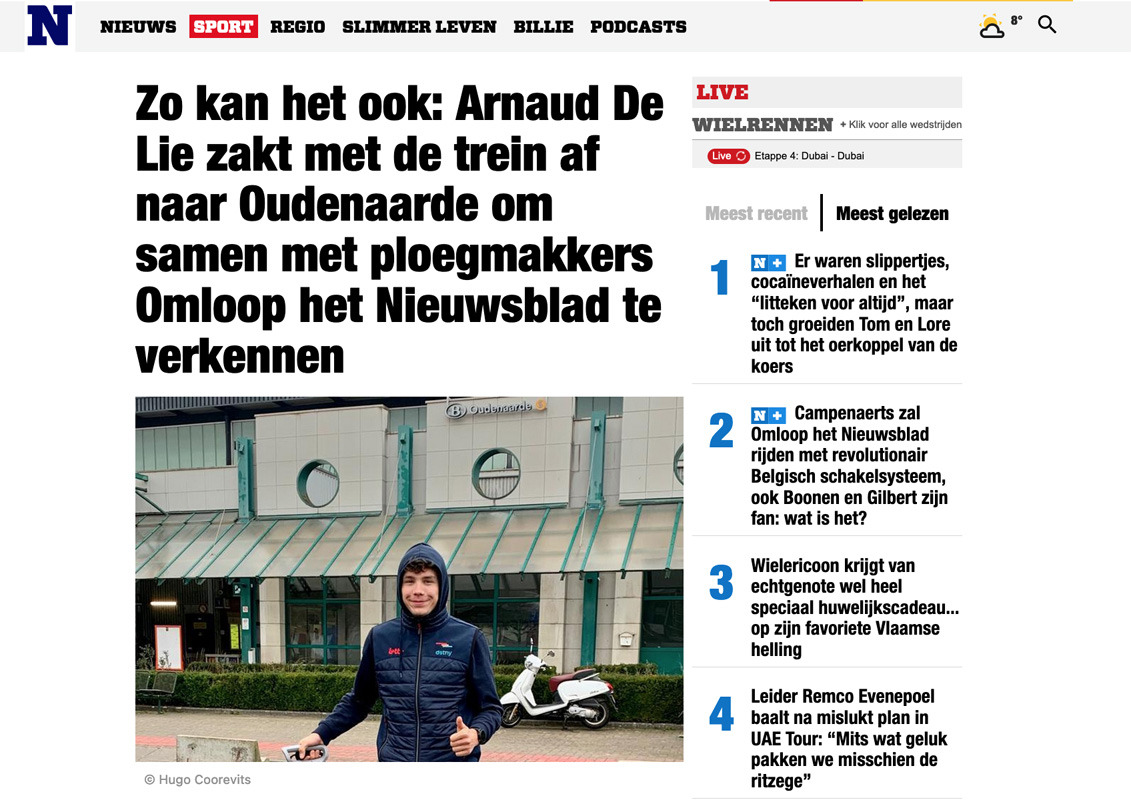
Arnaud De Lie took the train to Oudenaarde to join his team’s Omloop recon ride, not quite news you need to know but it shows how every angle is covered. Workers are filling in potholes. The first people to park a camping car on the course have arrived, and been interviewed. At best all this is tangential to the sport but you can have your fill.
But there’s more, take Patrick Lefevre saying the recently he could have signed Wout van Aert but he wanted to keep doing his cyclo-cross, so the deal was off. Lefevre added, with a salty flick worthy of Salt Bae, that he’s spent too long doing cyclo-cross and that he ought to have won the Ronde by now. Van Aert promptly labelled his next ride on Strava, a 6 hour session including a climb up the longest side of Mount Teide, “cyclocrosser’s training” as a prod back. It’s gentle stuff but shows the palimpsest of rivalries, stories and more in Belgium, someone says something on TV one night; someone else labels their Strava rider in response. It’s a level you don’t get elsewhere. Anyway, if you want to join in then Het Nieuwsblad, Het Laaste Nieuws and Sporza offer plenty and translation engines are very good at putting it into English or whatever your first language is.
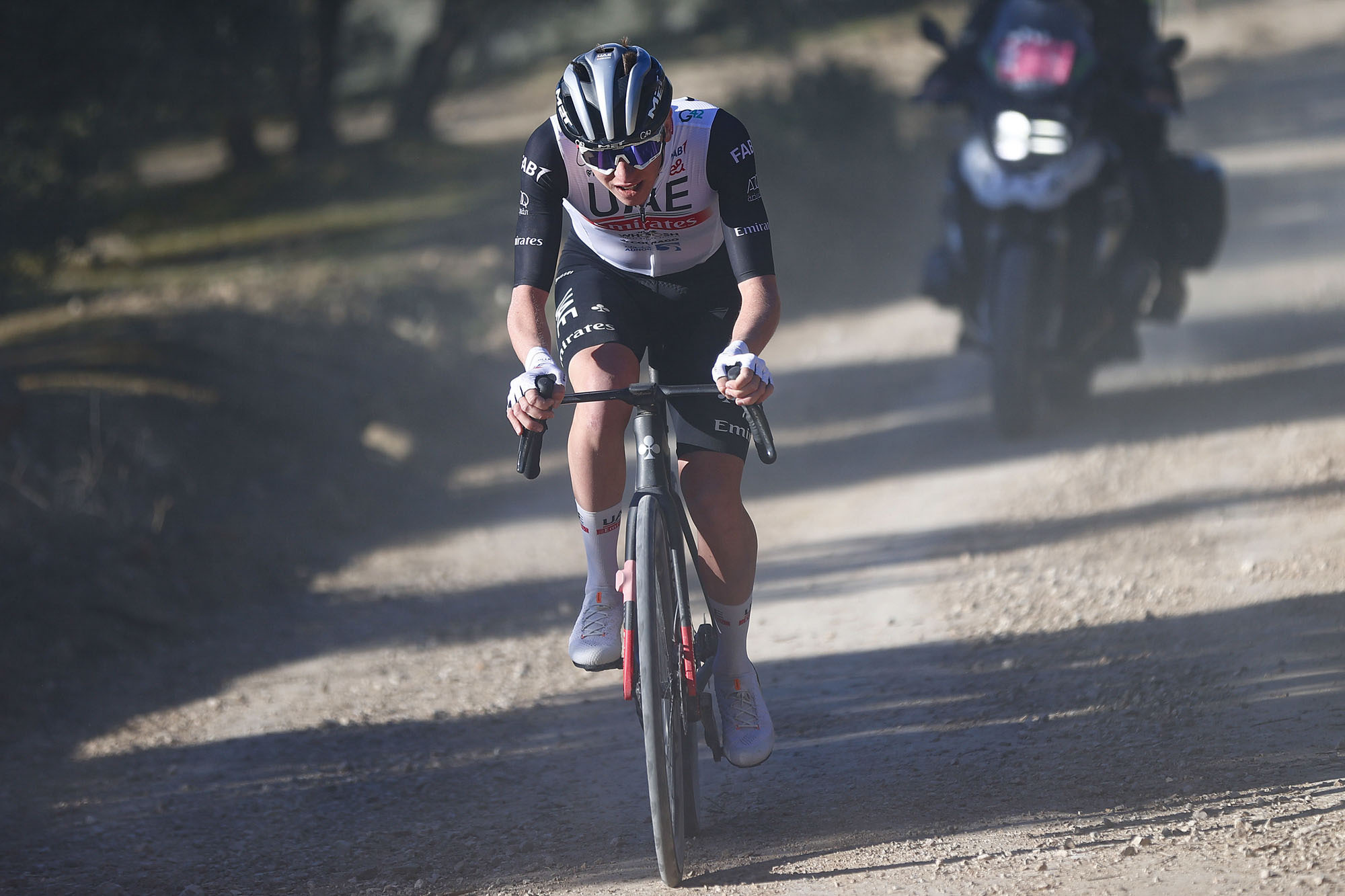
One subject that hasn’t been a drama because it’s been well-managed is Tadej Pogačar’s race programme. Yes is riding Paris-Nice and won’t do the Strade Bianche. He’s changed his plans for the season. All this was decided a long time ago but has only come out lately. Not riding his team’s home tour was a big deal and if he’d announced he wasn’t doing Tirreno-Adriatico back in January it could have been a story for a day rather than a note. Plus it keeps his rivals guessing. The one day goals are Milan-Sanremo and the Tour of Flanders. Once he’s done with the Tour of Flanders that’ll be it for Pogačar for a good while. Perhaps we’ll see him in the Tour of Slovenia again, if not then it’ll be the Tour de France.
🟢SPRINT VERDE (16.7km) Concello de Guntin
1 – 11 Jonas Vingegaard (TJV) – 20 pt (+ 3'')
2 – 35 Ion Izagirre (COF) – 17 pt (+ 2'')
3 – 15 Rohan Dennis (TJV) – 15 pt (+ 1'')— O Gran Camiño (@ograncamino_igt) February 23, 2023
Meanwhile in Spain Jonas Vingegaard starts his season today and at pixel time he’s hardly easing himself back into the sport, instead he’s taken the first intermediate sprint of the day in the O Gran Camino race.
Now to slower starts, as Alpecin-Deceuninck are now the only team without a win after Groupama-FDJ and Ag2r Citroën both triumphed last weekend. What’s striking is just how much of a slow start Alpecin have had, the entire team has 117 UCI points, teams like Q36.5 are on double that, Bardiani is on four times that. Of course it’s still February and once Mathieu van der Poel is on the start line he’ll score. As L’Equipe pointed out (Sunday’s paper edition) his win rate is an astonishing 23%, as in he’s got 40 wins in his career for 170 race days. Jasper Philipsen will add more but still, the newly promoted team have yet to get going. Astana are on 157 points as well, a slow start as well and they seem to have long term challenges as well. It’s far too early for “relegation watch” but we can see which teams are under pressure, not for the licence but just to get going.
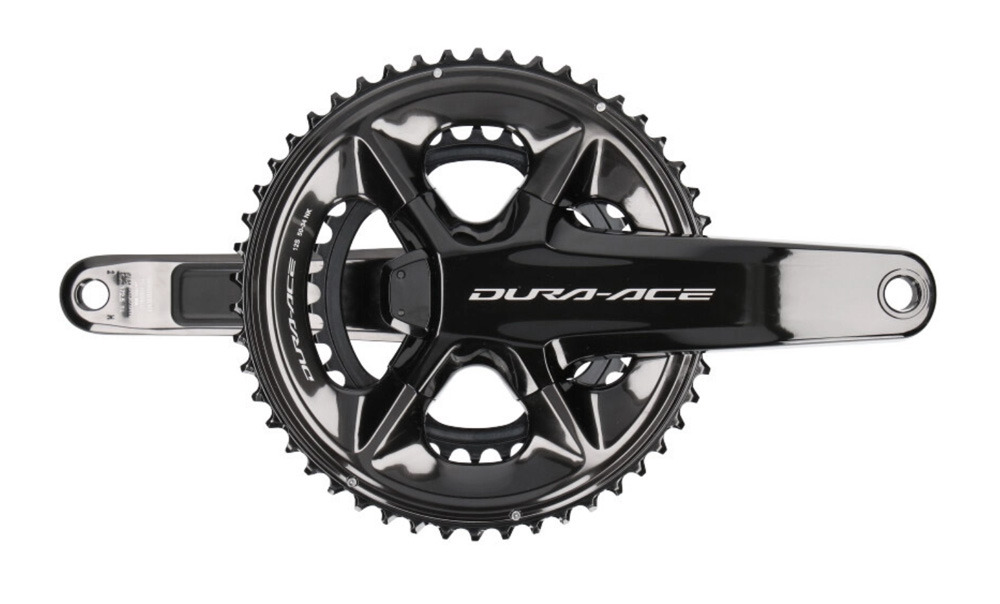
Finally, talking of measuring performance problems, Shimano’s Dura-Ace power meter has got a roasting from DC Rainmaker in a recent review. The blogger is known for his detailed analysis, not for him a “hot take” or a “first impression review”. It’s an problem for consumers and the manufacturer Shimano which seems to have released a premium product that has issues with accuracy and consistency when it ought to function like a Swiss watch; although an issue reduced because, while the rest of the 9200 Dura-Ace group was released late in 2021, getting hold of a 9200 power meter has been hard and good luck finding one for sale in 2023. But it’s also an issue for teams and riders who face the same problems, they might have units made available to them but word is even these can have issues.

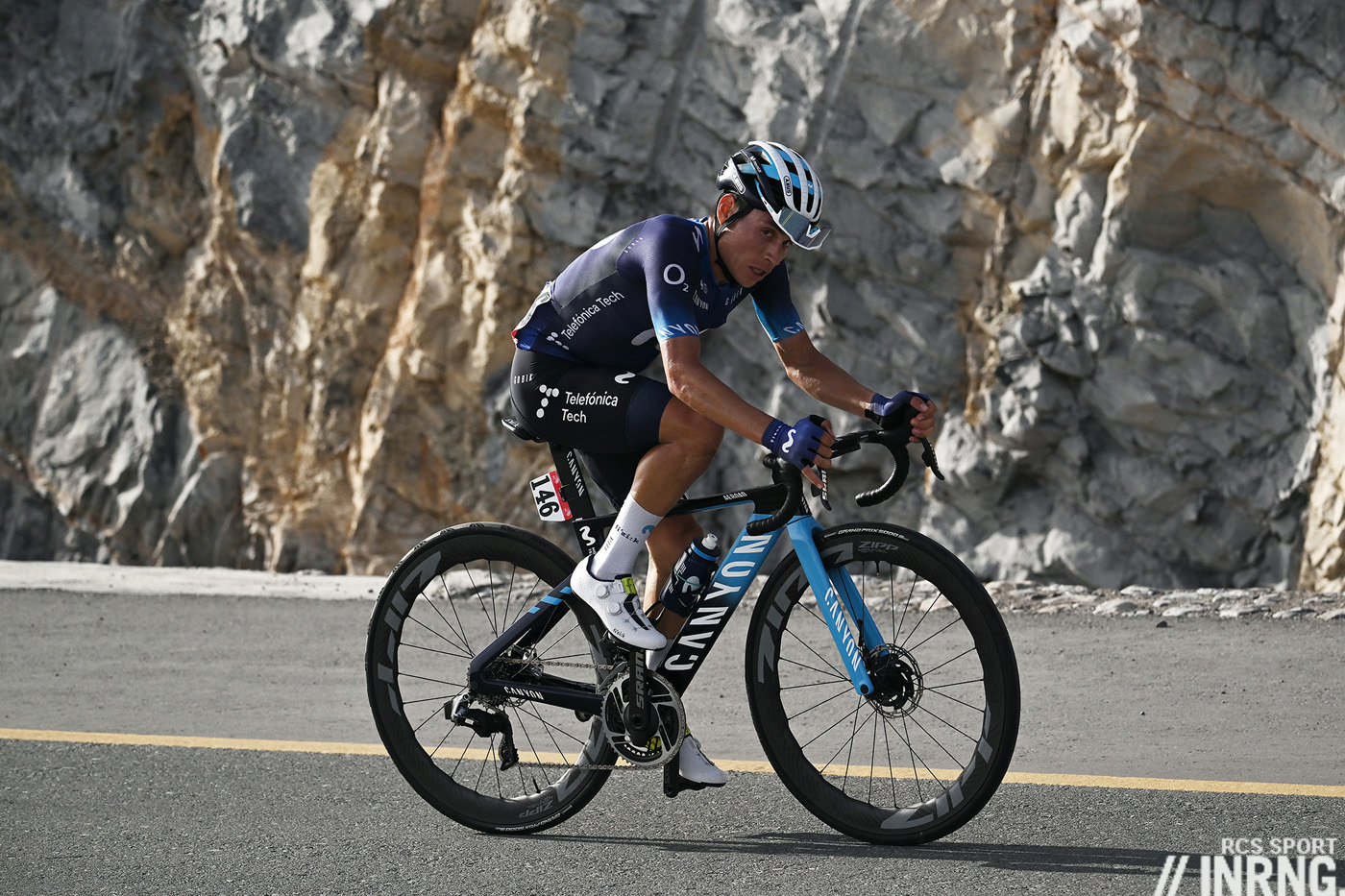
Shame about Pogačar dropping a lot of one-day races but inevitable that the team want him to be as fresh as possible for the TdF after last year’s defeat. I’m sure he’ll ride the TdF more conservatively than last year too. I’d like to see him do the Ardennes (WVA too – don’t know if he plans to) but maybe another year. For me, there’s certainly an argument for it being more impressive for a rider to win multiple types of races – one dayers and grand tours, for instance – and perhaps win fewer TdFs, but the team are bound to have one focus beyond all others.
Terrible news to hear about non-functioning powermeters…
Why not even it up for everyone and make mandatory ‘racing powermeters’ that only show you your data after the race. Bring back the skill of having to measure your own efforts – might tilt the balance a wee bit away from the younger riders, making experience a greater advantage than it currently is.
Having only ‘race radio’ that tells all the riders the same info. – safety, etc. and nothing else – would also help those with greater knowledge of bike-racing. Imagine… riders having to think.
NOT me above, but whole-heartedly +1
Excuse my unintentional anonymity.
Everyone still has to measure their own efforts, if you’re suffering and on the limit on a climb, you can’t look down at the power meter to see the display and discover you’re actually working too hard or too little. You know it already as the body provides instant real time data; plus there’s no precise threshold, you might be able to do, say, 380W for a 40 minute climb in training but another day it’s 370W, in a race you are tired because you’ve used up energy to get to the climb so can’t get close, it’s several stages in, it’s Thursday etc.
Also plenty of riders don’t even want to know the number during the effort, some will even switch their displays to show the climb they’re on, eg the gradient to come, KM to the top etc as this is often more what they need to know, especially if on an irregular or unfamiliar climb.
But it does make a difference in training and the Shimano concern here is that it’s off enough such that during a long race even things like calories spent are potentially out by quite a way.
I’m sure plenty of riders don’t ride by their meters, but some do. And I’d prefer to see everyone having to work out how hard they should ride for themselves, and what tactics they should use (beyond instructions given before a race) in whatever situation is presented by their opponents.
Still you don’t answer the main question: why should they be allowed at all in races?
Ferdi – people never answer that question. Or they say that radio is needed for safety. Victor Camparnaerts, Thomas Voeckler, and Jos Van Emden have all said that team radios produce more problems because teams are shouting at the men to all get to the front. Race radio would be safer. Also nobody needs a power meter. Why does anybody need a power meter? The only reason these are in cycling is that the teams will complain if they are taken away. Because they want to be in control of their riders.
The safety aspect doesn’t need verbal radio.
It can be addressed by a dedicated telemetry unit with both sending and receiving capabilities, with all teams required to use this unit where they currently use a sponsor’s head unit. The casing should be designed such that stickers for their power meter brand can be stuck on the outside.
Transmission capabilities:
– send request for food/drink service (sends text alert to that team’s car/s)
– send request for mechanical service (text alert to that team’s cars, goes to neutral service if rejected by team)
– send alert for crash/emergency at current location (text alert to all team cars and official cars, overrides standard food/drink or mechanical messages)
Receive/display capabilities:
– standard cycle computer info
– route info
– confirmation of food/drink and mechanical requests
– time gap information (replacing the time board moto)
– race director information overriding the selected display – e.g. flashing yellow and beeping to neutralise race at 25 km/h, flashing red and beeping to neutralise and stop behind the next official car etc
DaveRides, would a radio be simpler to use for riders, and thus safer?
It’s fine for the rider to talk to the team directly.
Also, with any safety warnings, etc. that are coming from the organisation, would a rider be more likely to be aware of them, and more quickly, if they came into their earpiece?
And is it more dangerous if they have to read while riding?
Fine for rider to talk to team, but not for team to talk to rider, via radio.
The suggestion that radios cause problems with riders being instructed to get to the front seems to imply that this wouldn’t occur to the riders on their own. They aren’t radio-controlled automatons.
d. nixon, there’s clearly a big difference between riders being told in pre-race meetings with their teams that at 77km to go there’s a narrow road and we want to be at the front there, and 180 riders all being shouted at to get to the front at exactly the same time.
Some riders would forget, some would think ‘This doesn’t really matter’ in the moment, and all would have a far lesser sense of urgency, due to not being instructed to do so directly at that precise point in the race.
Also, ‘this charging at dangerous bits’ is a pretty recent occurrence – hardly happened pre-Sky. Then, Sky started doing it – ‘to keep their riders safer’ – and then everyone had to copy.
Get rid of the person shouting down your ear and the problem will be considerably lessened.
If riders – e.g. van Emden and Voeckler – say that this is what happens and that it’s a problem, I tend to believe them.
In the situation you describe the issue is that teams are choosing to race in a different way than they used to, they are just using radios to achieve this. Radios existed before team sky came about. Getting rid of radios wouldn’t change the team’s desire for their riders to be at the front at a certain point, they would just have to find a different way of achieving this which may not be as effective as radios so could reduce the likelihood of crashes in these situations as you say.
This may be a bit of a straw man argument but I feel that people arguing to get rid of radios and power meters wish that cycling would return to how it used to be. This romanticised ‘jumper for goal posts’ sort of cycling isn’t going to be achieved by doing so. The sport is different than it used to be for a myriad of reasons, not just because of power meters and radios.
d. nixon, for me it’s certainly not a romanticised version of how cycling supposedly was. I watched throughout the 90s and onwards (albeit that was when radios came in), and cycling wasn’t more exciting back then. It tends to go in phases: for instance, I found the GC of the TdF dull during Sky’s domination and the whole ‘train’ thing, and this carried on with Jumbo, but of late the excitement has picked up, probably primarily due to Pogacar.
I just can’t see any way that radios and meters improve cycling; and it may be that cycling would be more interesting without them. The older riders would probably benefit – and I like the idea of it not being all about legs.
@Anonymous
Radio is too complex, too much yakking about too many non-safety subjects. This argument about radio allowing riders to be alerted has been endlessly trotted out for years, but radios are still causing crashes and there is zero evidence that a crash has ever ever been prevented by radio use. Get rid of the earpiece and riders will be more alert to their surroundings.
Replacing it with a standardised race computer which could perform the role of the Yellow Flag signal as used in motorsport will result in a far quicker and clearer signal to stop racing and look ahead for a hazard.
There’s no need to ‘read’ when such an alert would be the whole screen flashing yellow over the top of the normal info, and accompanied by a loud alert tone.
Why allow gearing? A rider can pick the single speed ratio in the morning and it’s on them for the day 😉
But not having team radios or powermeters would mean that the riders have to use their brains more.
Not having gears would not mean that.
So, it’s not a relevant comparison.
Single gear was set it and forget it, no thinking required aaand it was decided by the team director.
Adding gears introduced more nuance, riders had to think about which gear to choose, when to go from the big to the inner ring and vice versa. You had to have a feeling to apply right amount of pressure to the shifter and for a brief moment release pressure on the pedals, overshift a bit and then listen to the chain and shift back just a bit. Doing this under racing conditions, in the moment when the race is being decided, was not a trivial task.
🙂
Asking “why allow gearing” can surely be answered by digging up the arguments used in Desgrange-era debates and how the man made up his mind. Bit, surely, asking that question does not provide a reason why power-metres should be allowed at the races in the first place. It actually sounds like confessing to not having one such reason.
For the post race analysis. You don’t wanna miss the data collection. Data is vital for the ongoing training analysis and subsequent correctional means.
This stated slightly tongue in cheek, of course.
Data collection adds nothing to the follower’s perspective, especially when that data is not even shared publicly. Rider and DS convenience or interest are certainly not reasons why an element of equipment should be allowed.
And don’t forget: for calculating the recovery/food intake.
Thank you Mr Ring for this sensible sense check on the ‘technology bad brigade’.
By the way are you and DC Rainmaker one and the same? Just a thought…
Well this is “Thursday *shorts*”, rather than 16,000 words analysing Einer Rubio’s Jais win 😉
Just teasing, and kudos to DC for his thorough reviews and explainers, it’s often the standard to measure other reviews by (something other professional reviewers say), especially for big ticket consumer tech items.
I don’t know why you dismiss people who think that certain technologies don’t make racing more safe and/or more exciting as the ‘technology bad brigade’.
It’s nonsensical to say that just because one is against team radios and power meters that means that one is against all technologies.
I’m all for gears, lycra, helmets, carbon bikes and so on. That doesn’t mean I think that disc brakes have improved racing: I think the time it takes for neutral service to do a wheel change detracts from the racing.
It’s entirely dependent on the specific technology.
Perhaps you can explain the advantages of having teams giving tactical orders down the radio to riders during the race, in terms of entertainment?
Or why you prefer that riders don’t have to judge their efforts themselves but can instead rely on a piece of equipment to do that for them?
Just because a technology exists doesn’t always mean that it improves matters.
Road cycling is a sport that already bans quite a few technologies – e.g. recumbent bikes, lighter bikes – are you railing against this technology-hating luddism?
Quite.
A rider relying on a power metre is ripe for a bad day, its not a cure all performance guide. Having a power does not really tell you what you can do right now. At best it tells you what you can do on a good day with nice preparation for a given time.
It does not tell you what you can do now at the end of a race or during a longer tour. Nor does it indicate if you should follow a surge or not. When to attack and how much power you should put in for a short period. How long do you hang on to somebodies wheel if you are going to hard. The power metre offers no tactical advice.
For all these things and probably more besides your body is a more accurate measuring device and your own brain (or team car) is provides the decision.
That said somebody setting pace could probably use a power metre much more deliberately.
It might liven things up a bit if they could all read each other’s power meter!
Pick a random number at sign on to see whose power data you get to read!
Ethan Hayter is famous for riding to the power meter. It is the main reason you often see him hanging off the back. Now explain to me how that detracts from his skill or entertainment value.
Acres of the same old arguments from the same old posters with the same old, underlying message at the bottom of it which was made explicit halfway through but buried amongst the verbiage. It’s all Sky’s fault. It’s always all Sky’s fault.
Only in your head, RonDe.
I don’t know about the sunny climes of the Mediterranean, it looks like sleet at O Gran Camino!
True, early season races in Spain tend to be in Andalucia and Valencia for a reason. Galicia in February, what were they thinking?
If it was Belgium and opening weekend, ok, but snow, +3C , helicopter camera is icing up going by the pictures from it and riders going numb. Unbelievable!
Sounds about like the weather we’ve had in some parts of Belgium a week ago or so.
And it will be ~3-5°C max. tomorrow in Flanders too (although without rain or snow). A combination of snow & cold temperatures might not be common, but is also not unheard of this time of the year…
Well, Galicia is anything but Mediterranean. Pretty normal North Atlantic spring weather…
I don’t think rob md placed Galicia on the shores of Mediterranean. I read it as a comment pointing out that some riders didn’t have to wait until Saturday to swap the sunny climes for more northern ones – and a as a quip pointing out that they may have got more nothern weather than they wished or could anticipate.
PS I think it was a wise decision to stop the stage. It’s one thing to expect riders to persevere in spmewhat adverse weather conditions and a quite another thing to require them to ride in conditions that are patently unsafe.
In retrospect then, should they have stopped the Giro Stage 15 some 35 years ago?
No “Extreme weather protocol” back then, but the stage was shortened anyway I seem to remember.
Anyway, bad Belgium weather in Spain was the point I was making. Hope no one got frost-bite.
Well, they canceled the Stelvio stage in 1984 — even though the roads and weather were clear!
I don’t think the ’88 stage to Bormio was shortened, it was just a crazy short stage (by contemporary standards — 120 km — nobody would bat an eye today). And nearly everyone turned around and went home in LBL 1980 — but the race went on.
Yes.
It made fantastic epic road cycling history, of course, but it wouldn’t have made that edition of Giro less memorable or the winner less worthy or made road cycling a somehow lesser sport.
PS It was the following stage that was shortened in 1988: “Due to very poor weather conditions, the start was moved from Bormio to Spondigna and the stage was shortened rom 132 to 83 km. The route originally had the riders crossing the Stelvio Pass, but it was skipped due to snowdrifts that had developed on the roads.” (I had to look this up…)
It’s also 10 years ago now (how time flys) that Nibali won in the snow at Tre Cime (and the stage before that was cancelled)
Maybe Vingegaard should have done the UAE tour as it’s 31C there today – no wooly mittens required there!
Not sure if it was fair to the riders in the break who wanted to push on (and did until – part of – the rest of the peloton forced the stop). It should also be taken into account that conditions were fast improving, and that, if anything, they could have had a decent on-the-spot finish line on the top of the climb, just avoiding the descent. So many cyclists have so little chance of playing their options for a victory that I feel that when peculiar circumstances allow that, with no life or death risk (please note that if the peloton just gives up stage victory, the risk drops to close to nought), well, cancelling is not very fair. It’s not like the TDF just cancelled that whole Bernal stage, although dping it could have even been great for Alaph…
Saying as some did “it’s a minor race, just cancel the stage” implies not understanding that such a minor race might be *the* race for “minor” riders or teams, and you just cancel the stage because Vingegaard, to whom surely it *is* a “very minor” target, however symbolically relevant, came and asked to do so (on behalf of several other interesting parties in the bunch, no doubt).
Spot on, Gabriele. I would have even been harsher with the riders who collectively forced this. There’s an obvious element of cunning in their behaviour, covering not only in the search of sheer convenience and comfort, but also from a competitive point of view, from those who would have perhaps said goodbye not only to the stage, but to all GC hopes. The strike allowed, for one, Vingegaard to match Pogi’s Andalusian start. Let’s not forget the Gavia lesson: a snowy stage can condition a stage race GC, in a completely decisive way, in favour of those who prepared better and fought harder.
Why is it that we assume that the decision was made after threats of a strike were made by riders and DSs?
But, yes, we cannot dismiss politics and various self-serving interests.
Anyway, shortening the stage, that is making the top of the climb the finish line would have been a decision I could have accepted – but only if it had been made so as not to more or less gift the win to the breakaway.
(My impression was that the breakaway was already doomed and it would have become a sprint from a reduced bunch.)
The only decision I would have had a problem accepting would be to race it as planned because Hampsten and Hinault and Gavia and LBL…
I probably read too much into rob md’s comment, but according to Danish media it wasn’t Vingegaard or Jumbo-Visma that were the instigators of the the riders and teams call to get the stage stopped.
Vingegaard went to the race commisaire’s car as a spokesman for the whole peloton after many had already voiced their concern for safety (or just their interest to avoid the hardship).
(Danish winters aren’t exactly arctic, but they certainly can be cold and wet!)
I don’t believe Vingegaard was the first to talk to the organizers, but he’ll be chating to them again today (Saturday) as it’s snowing again. Route changes: the Alto de Santa Mariña (twice) not to be riden. Maybe this race should be in September…
We have had so-called WT racing for some weeks but the serious stuff starts on Saturday with Het Nieuwsblad and then K-B-K on Sunday. It’s predicted to be fine, cool and breezy for both. For an armchair and fine weather rider like me, it seems astonishing that after a hard 207km on Saturday they can come back and perform for another 193 on Sunday – long days for the RTBF commentary team too! The first races are always fascinating with surprises and new kit to pick out too – FDJ not as easy as it was.
Hey Inrng – do you know if there is a live feed from KM0 for Omloop? I see the GCN coverage starts at 1230 UK time but I bet the start is going to be interesting!
1230 GMT / 1330 CET is the start of video. Pace yourself, that should be plenty as the first 100km aren’t too exciting course wise and the weather doesn’t look wild either.
Race preview on here tomorrow, complete with TV times etc.
Haha thank you, excuse my excitement! My wife will also be happy to hear that. I had heard that there was a chance of high winds, but I will patiently await the preview!
And this Shimano debacle may be why Campagnolo has been so careful with the development and release of their power meter crankset?
In Belgium, even the weather forecast is about cycling.